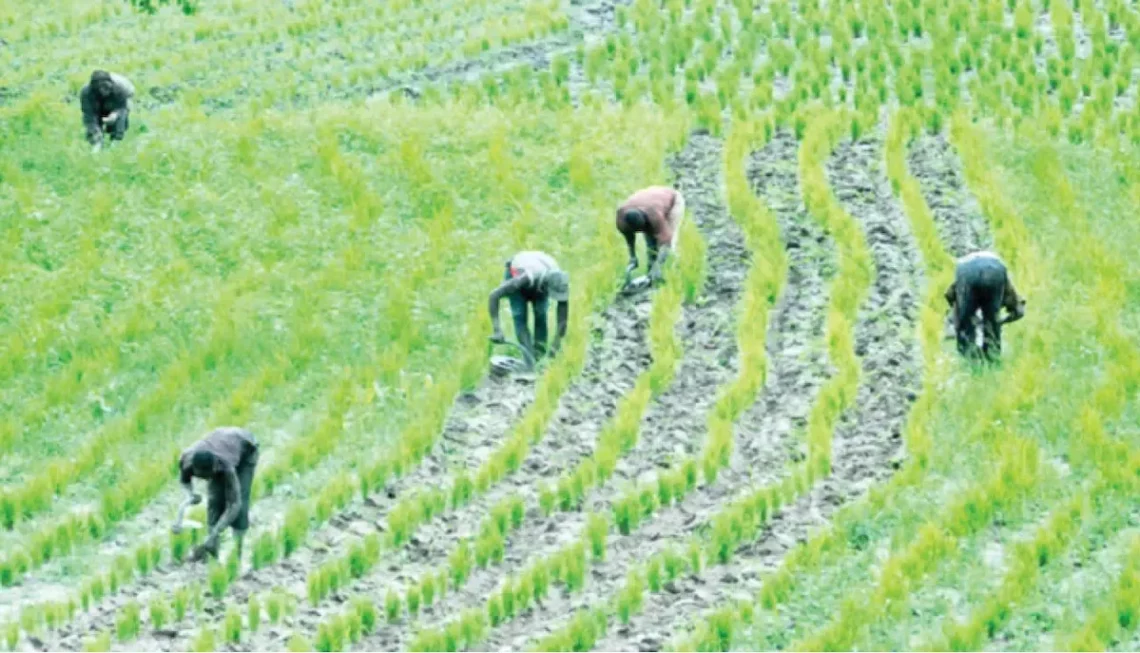Over the past decade, conflicts, land encroachments, and economic instability have forced millions of Nigerian farmers to abandon their lands.
A significant portion of Nigeria’s farming population has been displaced due to insecurity, with over 3 million people unable to cultivate their land.
These displaced individuals, many of whom possess generational farming knowledge, are currently reliant on humanitarian aid.
However, the National Agricultural Land Development Authority (NALDA) has unveiled a transformative initiative designed to reintegrate displaced farmers, improve food security, and create sustainable economic opportunities.
The Restoration Project, a cornerstone of NALDA’s renewed strategy, aims to reintegrate over 3.5 million displaced individuals back into productive farming, ensuring that their expertise and labour contribute to the nation’s food supply.
The Restoration Project will provide displaced farmers with access to secure farming settlements, where they will receive essential inputs, mechanisation support, and training. The initiative also incorporates a strategic grain storage system, allowing the government to stabilise food prices by mopping up surplus produce and redistributing it when necessary.
NALDA’s executive secretary, Cornelius Adebayo, outlined the agency’s vision emphasising the strategic, long-term approach to reviving Nigeria’s agricultural sector.
He stressed that the Restoration Project is not merely an intervention but a structural transformation that will convert Nigeria’s agricultural setbacks into a success story.
“If we can put these people back into the economy by being productive, they become self-sufficient. They will not only produce what they need for themselves but also contribute to national food security.
“This will help Nigeria reduce dependency on food imports and ensure that internally displaced persons (IDPs) are empowered rather than dependent on aid,” Adebayo explained.
One of NALDA’s flagship initiatives under the Restoration Project is the Renewed Hope Farm Settlements. These settlements aim to clusterise farmers into secure, structured communities where they can access support systems efficiently. By placing farmers in designated farm estates, NALDA seeks to address critical challenges, including: establishing controlled perimeters and trenches around farm clusters, NALDA will minimise unauthorised access and herder-farmer conflicts.
Also Inputs such as fertilisers, seeds, and mechanised tools will be directly distributed within the farm clusters, reducing diversion and ensuring optimal use and agronomists and technical experts will be stationed in these settlements to provide continuous support and training.
“We are not reinventing the wheel. Farm settlements were a successful model in the past, and they worked. Now, we are bringing them back with improved efficiency and security,” Adebayo stated.
Recognising that large-scale agricultural development requires significant capital, NALDA has introduced a de-risking model to attract institutional investors. The agency is working with private entities that own vast farmlands but lack the financial resources for land clearing and infrastructure development.
Through this model, the government will clear and prepare farmland in exchange for a percentage of future yields. This sustainable funding mechanism allows NALDA to support smallholder farmers without continuously relying on budget allocations.
“Our goal is to treat agriculture as a business, not just an intervention, we are partnering with investors who are serious about large-scale farming—whether it’s cocoa, cashew, sesame, or palm production. This is the same model that Malaysia used with Felda, and we can replicate its success,” he said.
In addition to land-based agriculture, NALDA is tackling Nigeria’s aquaculture deficit through the Aqua Hope Project. Currently, Nigeria imports over a million tons of fish annually, despite having vast water resources. The project encourages youth and women in riverine communities, particularly in states like Bayelsa and Akwa Ibom, to engage in fish farming.
By clustering fish farmers into integrated aquaculture hubs, NALDA will provide them with access to fish breeding facilities, processing and packaging centers and cold storage and export opportunities.
“Why are we importing tilapia when we can produce and export it ourselves? By building fish farming clusters with the necessary infrastructure, we can create 300 or more entrepreneurs in one location,” Adebayo noted.
Another key initiative under NALDA’s reform agenda is the promotion of greenhouse farming and solar-powered irrigation. With increasing climate unpredictability and rising fuel costs, traditional open-field vegetable cultivation is no longer sustainable.
Greenhouse clusters are being developed in strategic consumption areas such as Lagos, Abuja, and Port Harcourt to ensure year-round vegetable production. These high-tech greenhouses will be powered by soalar energy, reducing dependency on fuel-driven irrigation systems.
Adebayo emphasised the economic benefits of this shift, “Developed countries do not depend on open-field cultivation for vegetables. We must move towards greenhouse farming to ensure stable supply, reduce post-harvest losses, and boost exports.”
Beyond food production, NALDA is working to formalise the agriculture sector by encouraging farmers to register as enterprises. By operating as structured businesses, farmers will gain access to financial services, insurance, and government support programs.
“We take a lot for granted in Nigeria. Many people working in agriculture are technically employed, but because they are informal, they do not reflect in employment statistics. We are changing that by encouraging farming cooperatives and enterprises,” Adebayo said.
The Restoration Project and NALDA’s initiatives mark a paradigm shift in Nigeria’s approach to agriculture. Instead of relying on short-term interventions, these programs focus on long-term sustainability, public-private partnerships, and structured farming systems.
By reintegrating displaced farmers, enhancing mechanization, promoting high-tech farming, and fostering entrepreneurship in agriculture, NALDA is laying the foundation for a food-secure Nigeria. As Adebayo succinctly put it, “When you are not secure in food, you cannot be secure in other areas. Food security leads to general security. The best way to engage the largest number of Nigerians in one goal is agriculture.”





